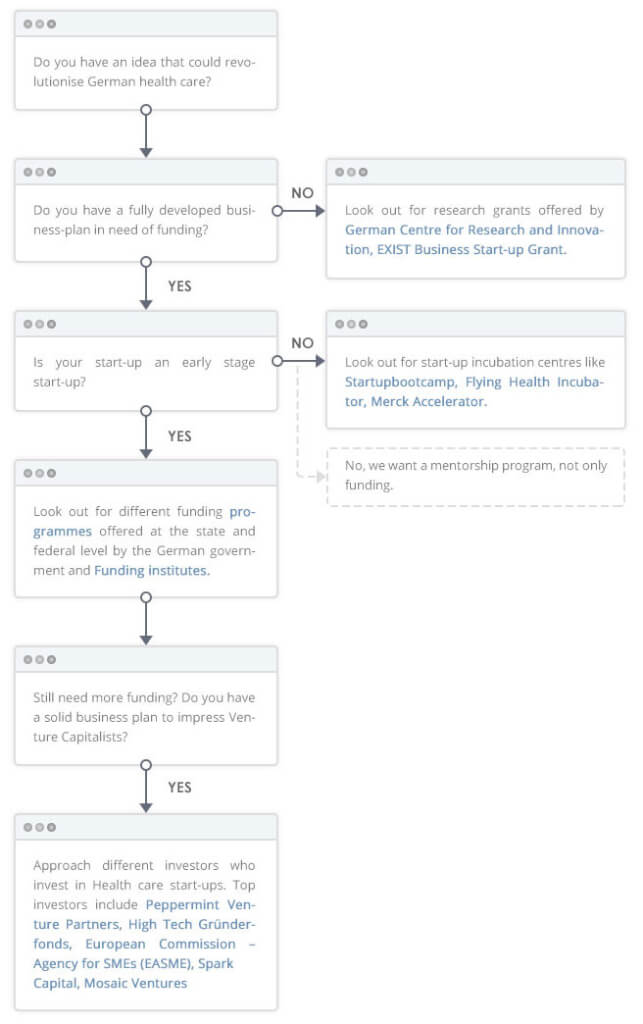
Please read the full article for detailed information on current investment scenario in Germany and various government initiatives to help you raise funding for your startup.
Current Scenario in German digital health sector
The health care industry is one of Germany’s largest and most promising growth markets. The continued increase in chronic diseases and an increase in aging population is driving this development. These factors, combined with the increasing digitization of society and growing health and fitness awareness, are paving the way for digital solutions in primary care and the privately financed health care segment.
Digital health investments have been on track to hit a record of 4 Billion USD last year. Investors are looking to invest in companies with experienced entrepreneurs, a good grasp of market dynamics and a unique idea. They are more willing to invest in riskier ventures who are going to make it big in the market in the future rather than a perfect solution which will limit itself.
Companies like Peppermint Venture Partners and High-Tech Gründerfonds regularly invest in digital health startups every year.
| Recommended for you | |
| 300 Innovative digital health startups in Germany | |
| Introduction to digital health market in Germany | |
| 50 Venture capitalists in Germany |
Typical investments in different phases
The amount of health care investments depends on the stage the health care investor is investing in the startup. Various funds invest in Health care with varying focus groups and at different stages such as angel round, seed round, pre-series round and series rounds (A, B, C, etc. Berlin based).
Germany is among the key digital health markets globally. It has sprouted dozens of prominent health care startups and attracted global investors.
Berlin-based Medigo, a curated marketplace that simplifies the complicated process of booking medical travel, raised $11.83 Million in different seed funding and Series A funding rounds led by Accel Ventures and CL ventures.
Clue, another eHealth startup in Berlin, which makes use of data science to provide insights into female health, raised $20 Million Series B funding in November 2016 from more than eight investors including Mosaic Ventures and Nokia Growth Partners. Careship is a Berlin-based startup, tackling elderly care, raised $4 Million from Spark Capital.
Top digital health incubators
XLHealth: XLHealth is a venture capital investor in startups specializing in the digital health care industry. With its Digital Health Made in Germany, XLHealth aims to find the best solutions for health problems through innovation and technology. Having been acquired by United Health group, it has invested $4.8 Million in a seed round funding in mySugr. It has also led funding rounds for Harima, Medoc, NeuroNation among others.
Startupbootcamp: Startupbootcamp’s Digital Health Berlin fills the seed funding gap for ten innovative Digital Health startups, creating an ecosystem of economic growth. The 3-month program is supported by Arvato CRM Healthcare, Sanofi in Germany, Munich Health and Deutsche Apotheker- und Ärztebank (apoBank) as corporate partners. Each selected team receives €15,000 plus six months free co-working office space at Rainmaking Loft Berlin.
Grants4app: Grants4app accelerator provides a mentoring program for digital health startups based in Berlin. It offers to emerge, entrepreneurs, the guidance of Bayer experts, office space for 100 days and funding of 50,000 Euros.
Flying Health Incubator: Flying Health Incubator offers an exclusive environment for Digital Health startups to grow their digital diagnosis and therapy tools and take them to market. They offer an intense two-year program for startups in (literally) early phases. Flying Health Incubator has supported startups like ARYA, Caterna, Affective Signals.
Merck Accelerator: Merck Accelerator selects and help early stage startups and provide access to mentors from Senior Management and their global network of 50,000+ experts and staff. Selected startups also get tailored coaching sessions and workshops given by the Merck Innovator Academy. They have supported startups including Atacama, MedRxApp, Paramedics.
Government initiatives to help your raise funding
Germany supports entrepreneurs with some funding programs. If your business idea is convincing enough, you may obtain financing to help you start up your business, which will put you in a more secure position. Most of these funding programs consist of free loans, which offer you better conditions about their interest, loan periods and repayment terms.
EXIST Business Startup Grant supports students, graduates, and scientists from universities and research institutes who want to turn their business idea into a plan of activities.
German Centre for Research and Innovation offers a wide variety of funding opportunities for entrepreneurs at both the state and federal levels. The funding institutes provide not only financing for entrepreneurs, but also support with setting up a new business or expanding existing facilities.
Each of Germany’s federal states offers numerous customized services for entrepreneurs, including assistance with the funding process, finding the appropriate location for your startup, obtaining permits, recruiting personnel and providing information about growth areas.
Challenges
There are numerous problems encountered by digital health entrepreneurs. Lack of regulations and standardized procedures make it difficult to develop the medical product which can be approved quickly. Interoperability and cross-border exchange of data have been another topic which has been hotly debated.
Experts in the industry are pushing for the reforms to set semantics for the products which make it easier for the exchange of data among stakeholders across Europe.
All these challenges make it a bit difficult for the entrepreneurs to develop their product and impress investors to fund their venture.
The overall attitude towards established new venture ideas has significantly improved in Germany, both regarding the number of Venture Capital firms now active in the market and the volumes raised to invest in digital startups. Recently approved eHealth law in Germany and increased support of the German government to the entrepreneurs is likely to bring in more investors into the digital health sector.
Image credit: www.istockphoto.com

















